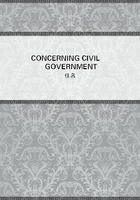
第33章
Of the Forms of a Commonwealth 132. THE majority having, as has been showed, upon men's first uniting into society, the whole power of the community naturally in them, may employ all that power in making laws for the community from time to time, and executing those laws by officers of their own appointing, and then the form of the government is a perfect democracy; or else may put the power of making laws into the hands of a few select men, and their heirs or successors, and then it is an oligarchy; or else into the hands of one man, and then it is a monarchy; if to him and his heirs, it is a hereditary monarchy; if to him only for life, but upon his death the power only of nominating a successor, to return to them, an elective monarchy. And so accordingly of these make compounded and mixed forms of government, as they think good. And if the legislative power be at first given by the majority to one or more persons only for their lives, or any limited time, and then the supreme power to revert to them again, when it is so reverted the community may dispose of it again anew into what hands they please, and so constitute a new form of government; for the form of government depending upon the placing the supreme power, which is the legislative, it being impossible to conceive that an inferior power should prescribe to a superior, or any but the supreme make laws, according as the power of making laws is placed, such is the form of the commonwealth.
133. By "commonwealth" I must be understood all along to mean not a democracy, or any form of government, but any independent community which the Latins signified by the word civitas, to which the word which best answers in our language is "commonwealth," and most properly expresses such a society of men which "community" does not (for there may be subordinate communities in a government), and "city" much less. And therefore, to avoid ambiguity, I crave leave to use the word "commonwealth" in that sense, in which sense I find the word used by King James himself, which I think to be its genuine signification, which, if anybody dislike, I consent with him to change it for a better.